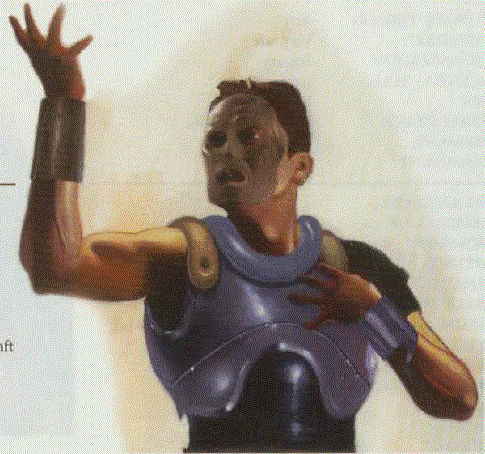
| Climate/Terrain: | Any/Urban |
|---|---|
| Frequency: | Very rare<1re· |
| Organization: | Solitary |
| Activity Cycle: | Any |
| Diet: | Emotions |
| Intelligence: | Low(S-7) |
| Treasure: | None |
| Alignment: | Chaotic neutral |
| No. Appearing: | 1-2 |
| Armor Class: | 0 |
| Movement: | Fly 15 (A) |
| Hit Dice: | 2 |
| THAC0: | 19 |
| No. of Attacks: | 1 |
| Damage/Attack: | Special |
| Special Attacks: | Emotion projection, graft |
| Special Defenses: | None |
| Magic Resistance: | Nil |
| Size: | T (1-2 square feet) |
| Morale: | Champion (15-!6) |
| XP Value: | 175 |
Soul masks were once used in plays and operas to communicate to the audience a state of mind or emotion: happiness, fear, hate, or sadness. However, unlike their mundane counterparts, they have been given life by the enormous output of emotion to which they have been subjugated; the spirit of the actors and the audience animates the soul mask and nourishes it. Without further emotional input, the soul mask would perish, thus it seeks to find a place where such emotion is plentiful, or else find a host upon whose emotional energy it can feed.
Combat: A soul mask has two abilities that it can use to derive its necessary sustenance. The first is its innate ability to project emotion (as the 4th-level wizard spell) at will to all who can see it. The emotion projected varies depending on the type of soul mask; any of the eight emotions detailed by the spell are possible soul masks, but soul masks projecting happiness, fear, hate, and sadness are the most common. Those who save against its effect are thereafter immune to this particular soul mask's emotion projection.
The second ability requires a successful attack by the soul mask on a humanoid (or any other target to which the mask can graft itself). Armor provides no protection against this attack unless it is a helmet, which, if it fully covers the face, renders the target immune. If the soul mask's attack is successful, it has grafted itself to the target's face. At that time, the victim must make a saving throw vs. paralyzation; if the target fails, she suddenly begins to act out a scene from a play or opera, playing to the hilt the part the of the protagonist but representing the soul mask's particular emotion. The scene takes 2d6 rounds to complete, at the end of which the victim can make another saving throw vs. paralyzation, with the same attendant consequences for failure.
Once the victim has made a successful saving throw, she resists the urge to act for 1d6 turns but is under the effect of the emotion spell. At the end of this respite, she must make another saving throw or continue to act out scenes. A remove curse cast by a wizard or priest allows the subject to resist the mask's effects for one day in combination with a successful saving throw. Spells designed to counter the emotion projected by the mask are ineffective. (The mask also provides the wearer immunity to such spells as fear and emotion.) A dispel magic removes the mask and renders it inert for 1 round, after which time it begins projecting emotion and attacking again. Any physical attack on the soul mask while it is grafted to its host also affects the host.
A somewhat two-edged benefit of the mask is that anyone wearing it gains the Acting proficiency and can play the part of any character in the mask's repertoire to perfection. Of course, this is because the victim is not truly acting—she feels only the emotion the soul mask projects.
Habitat/Society: Soul masks rarely congregate unless they were awakened together. Sometimes, two masks of opposite emotions are encountered together. The victims of such a pair of masks often become engrossed in a beautiful bit of contrapuntal dialogue.
Ecology: Soul masks are parasites that need emotional energy to survive. Each day a soul mask is deprived of emotional input, it loses 1 hit point. The materials used to construct soul masks are often quite mundane, usually wood or clay. Dead soul masks fetch market value for an ordinary mask (no more than a few silver pieces). Soul masks are not known to hoard treasure of any material value, but the repertoires of soul masks can be quite extensive, and they might be of interest to bards and actors for this reason.
by Leon Chang
